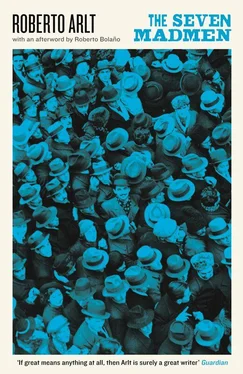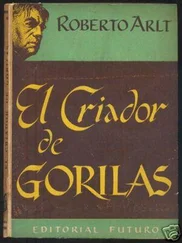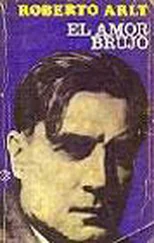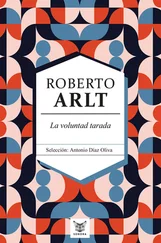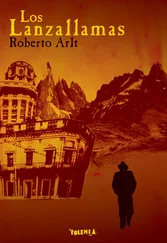An ironic smile flitted across Erdosain’s face.
“So you’re Pontius Pilate, are you?”
“You’re right, and quite unconsciously.”
Through the half-open shutters of the shady dining-room, they could see the garden. Tender shoots of honeysuckle curled towards the windowsill. Transparent insects buzzed around the lemon tree, and the house’s white walls were reflected in the honeyed depths of the waxed floor. The tablecloth fringe fell down over square table legs. A spray of carnations gave off its spicy scent in an Etruscan vase, while the silver cutlery shone against the linen and the china; shadows twisted up the glassy outlines of their glasses, or crept in triangles across their plates. There was lobster salad in an oval serving dish.
The Astrologer poured wine. They ate in silence. Then the Astrologer brought in egg broth, a platter of asparagus swimming in oil, an artichoke salad, and finally fish. For dessert there was ricotta cheese sprinkled with cinnamon, and fruit.
Afterwards he served coffee. Erdosain gave him the money, and the Astrologer counted it. “Here’s 3,500. Go and have a few suits made. You’re a good-looking fellow and you should dress well.”
“Thanks … but listen … I’m dead tired. I’d like to sleep a while. Could you wake me at five?”
“Of course, follow me” — and the Astrologer led him to his bedroom. Completely drained, Erdosain took off his boots, and threw his jacket over the bedpost. His eyes were smarting with fatigue, his chest was running with sweat, and then he thought no more.
He awoke in the dark to the sound of the Astrologer opening a shutter. He sat up with a start, while the other man said:
“At last! You’ve been asleep for twenty-eight hours.” And when Erdosain could not believe it, he brought him that day’s newspapers, and it was true, two days had gone by since he had last seen them.
Suddenly remembering Hipólita, Erdosain leapt from the bed.
“I have to go.”
“You were out like a dead man. I’ve never seen anyone sleep like that, so exhausted, you even forgot to go to the bathroom … oh, by the way, where did you get that story about the suicide in the café? I looked in yesterday evening’s papers and in this morning’s. There’s no sign of it. You must have dreamt it.”
“But I could take you to the café.”
“You must have dreamt the café as well.”
“Perhaps … it doesn’t matter … well?”
“Everything’s taken care of.”
“Everything? What about the acid?”
“We’ll tip it down the drain.”
“So then he …?”
“It’s as if he never existed.”
As they were saying goodbye, the Astrologer told him:
“Come on Wednesday at five. There’s a meeting that evening. Don’t forget to buy a suit off the peg while they’re making the other ones for you. You must come; the Gold Prospector, the Thug and others will be here. We’ll talk over our ideas, and don’t forget I’m really interested in that poison gas scheme. Draw up a plan for a small-scale factory for chlorine and phosgene gases. Ah, and see if you can find out what on earth mustard gas is. It destroys anything that’s not watertight and covered in oil.”
“Phosgene is based on carbon monoxide.”
“Don’t lose any time, Erdosain. A small factory that could be a training tool for revolutionary chemists. Remember our activities are divided into three areas. The Gold Prospector will be in charge of the training camp, you’re our Industrial Chief, and Haffner will look after the brothels. Now we’ve got the money, we mustn’t lose time. You have to set to work. What d’you say we set up a story that is the Argentine equivalent of Krupp in Germany. We have to believe in ourselves. Our society can spring a whole lot of surprises. We’re discoverers who have only a vague idea of which direction we’re heading in. 6If that!”
Erdosain stared for a second at the other man’s broad face. He grinned and said:
“Did you know you look like Lenin?”
And before the Astrologer could reply, he was gone.
Footnotes
1In the second part of this work, we shall offer an extract from Barsut’s notebook.
2This novel was written during 1928–1929, and published by Rosso in October 1929. It would be ridiculous therefore to think that the Major’s pronouncements were suggested by the revolutionary movement of 6 September 1930. It is however remarkable that the declarations made by the army revolutionaries of the 6 September movement should coincide so precisely with the Major’s, and that subsequent events should so closely follow his predictions.
3It was later discovered that the Major was a real rather than an imaginary officer, and that he had been lying when he said he was playing a role.
4Later Hipólita was to tell the Astrologer: “I knelt down in front of Erdosain when it occurred to me to blackmail you, after he had told me about the murder plan.”
5The decision to fake the murder was decided on at the last minute by the Astrologer, and discussed at length with Barsut.
6The story of the characters in this novel will continue in a second volume, The Flamethrowers .
AFTERWORD BY NICK CAISTOR
Roberto Godofredo Christophersen Arlt was born in Buenos Aires on 26 April 1900. The family name came from his father, who was born in Poznan, then part of the Austro-Hungarian empire. The first names came from his mother, who apparently chose Godofredo after reading Torcuato Tasso’s Jerusalem Freed . The couple were among hundreds of thousands of European immigrants who arrived in turn-of-the-century Argentina. Arlt’s father worked at a variety of trades without ever achieving much success; his mother had three children, but saw two of them die in the slum conditions of a chaotically expanding city.
Roberto’s father seems to have inspired fear and hatred in him: the “work of humiliation” that Erdosain describes in The Seven Madmen is apparently a painful memory of his own childhood. So unhappy was Roberto that he left home at the age of sixteen. He lived the rest of his teens in the smaller inland city of Cordoba, only to re-appear four years later in the capital, married and with a young daughter.
In the years at the start of this century, Argentina was at its most optimistic and economically powerful. Earnings from meat and grain exports placed it among the top ten wealthiest nations in the world. The Buenos Aires Arlt knew was rapidly being transformed from a small port in the far south of a still unknown continent, into a cosmopolitan city. Since the 1870s, Argentine governments had encouraged European immigration: from Spain, but also from Italy, from the Austro-Hungarian empire (among them the “Polish shoemakers” fascinated by spiritualism described in the novel), German and French people (including the much sought-after prostitutes also mentioned in The Seven Madmen ) as well as a large influx of Jews chased from Russia by the pogroms. There was also a large “English” community, although like Arlt’s second wife they were usually Irish or Scottish. They ran the gas companies, the banks, the trams and the railways and set up enclaves in the suburbs of Buenos Aires like the railway junction Temperley where much of the action of The Seven Madmen takes place.
Many of these European immigrants came from an agricultural, village or small town background. They were attracted to Argentina by the promise of land to farm: the vast spaces of the pampas and Patagonia which had only recently been opened up by the crushing of the indigenous Indian groups. But this land was firmly in the hands of a few owners, so that nearly all the new arrivals found themselves forced back into the port city of Buenos Aires, perched on the very edge of the Atlantic seaboard. There they were crowded into the rented tenement houses or conventillos that Arlt grew up in, which also loom large in The Seven Madmen . Prostitution, violence and street crimes were rife in this unstable mixture of backgrounds and languages, as the newcomers struggled to establish themselves not only in a new hemisphere but in a hostile urban environment. Yet this mix of foreign immigrants also brought invaluable new elements to Argentine society: books (including Dostoevski, whose Brothers Karamazov and The Possessed are clear inspirations for this book), new ideas, religious and political movements that included everything from Spanish anarchism to Soviet socialism. This mixture gave rise to a vivid cultural life reflected in the creation of that quintessential Buenos Aires music the tango, in newspapers, literary movements, and a thriving publishing industry.
Читать дальше
